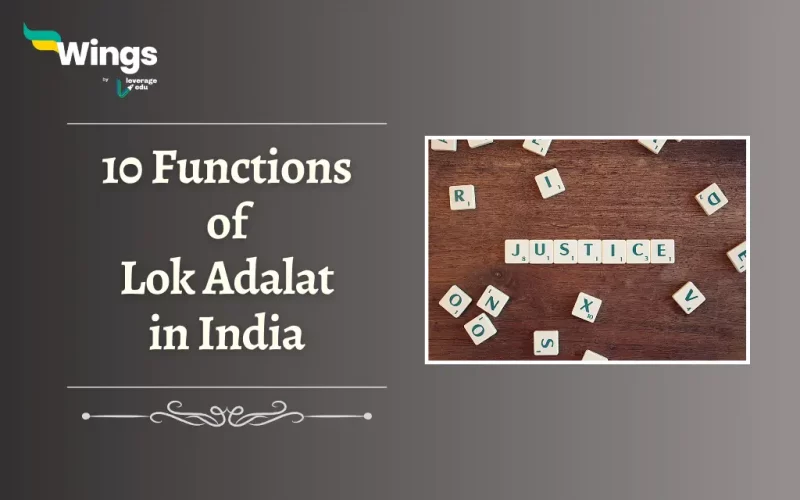Lok Adalat is a special part of India’s legal system. It helps settle arguments and fights differently through this Alternative Dispute Redressal mechanism. Moreover, instead of going to regular courts, people can solve their issues here quickly, without spending a lot of money. Additionally, Lok Adalats puts fairness first hence making sure everyone can access justice easily. Furthermore, they use talking and compromise to help people find solutions they are happy with. Consequently, these special Courts are spread out so that people who live in the rural areas can use them. Overall, Lok Adalats show India’s dedication to guaranteeing its legal system is fair, fast, and available to everyone. Read on to learn about the 10 Functions of Lok Adalat in India.
1. Fair and Unbiased Resolution
In solving problems, being fair and not taking sides is important and this function of the Lok Adalat is necessary.
- This helps everyone involved to feel like they are being treated fairly.
- Moreover, it is a basic rule that helps people trust the legal system and keeps fairness and justice alive.
- Impartial problem-solving means looking at the facts and arguments without any personal feelings or preferences.
Also Read: 3 Types of Lok Adalat in India
2. Timely Case Resolution in Lok Adalats
A very important part of the law is making sure cases are solved quickly and well as per this function.
- This helps make sure people get justice fast and do not have to wait too long for it.
- Furthermore, it also stops legal fights from going on for too long as is the case in most High Courts and Supreme Court.
- When cases are solved faster, it helps protect people’s rights and keeps the legal system fair.
3. Reimbursement of Litigation Costs
To make sure everyone can get justice, it is important to have ways to help people pay for Court fees.
- Moreover, this helps people who do not have a lot of money to still be able to go to Court and solve their problems.
- When the system pays back the Court fees, it is trying to make sure everyone, no matter how much money they have, can have access to fair treatment in a Court.
Also Read: What are the 6 Features of Lok Adalat in India?
4. Waiver of Filing Fees
Furthermore, to make sure everyone can get fair treatment in court, they also remove the fee you have to pay to file a case.
- This helps people from all different financial backgrounds get legal help without worrying about money.
- In addition, the idea is that justice should not only be for people who can afford it.
5. Voluntary Engagement in Lok Adalats
In this Function of Lok Adalat, these alternative ways to solve problems without going to Court work best when everyone agrees to take part on their own.
- In regular Court cases, people might be forced to participate, but in methods like talking things out or having a neutral person decide (mediation and arbitration), everyone involved has to agree to be part of it.
- Additionally, this choice to be involved helps everyone have a say in fixing the problem, thus making it easier to work together to solve things.
Also Read: What is the Difference between Lok Adalat and Permanent Lok Adalat in India?
6. Legally Binding Settlements
Alternative Dispute Redressal (ADR) like negotiation and mediation, works better when people know their agreements will be enforced by law.
- Moreover, this makes them feel safer to talk things out and solve problems without going to Court.
- So, guaranteeing ADR agreements are legally valid is important for resolving conflicts well.
7. Broad Jurisdictional Scope in Lok Adalats
In addition, Legal Services Authorities have a big job they cover many different types of law and places.
- Moreover, this means they can help people with legal problems no matter where they might be.
- They assure everyone has a fair chance of getting help with legal issues.
Also Read: 3 Exceptions to Fundamental Rights in India
8. Collaboration with Legal Service Authorities
State Legal Services Authorities, District Legal Services Authorities, and Taluk Legal Services Committees manage Lok Adalats. Additionally, they work together with the Courts and legal service organisations to support Lok Adalats.
9. Advocacy for ADR Adoption
Legal services authorities help make solving problems between people or companies easier by promoting and supporting ways other than going to Court.
- They do this by telling people about the advantages of using these other methods and helping them become part of the legal system.
- Thus, this helps solve problems faster and reduces the pressure on regular Courts.
10. Preservation of Confidentiality
Lastly, confidentiality is important in solving problems without going to Court.
- Hence, it means keeping things private and protecting the interests of everyone involved.
- When things are kept confidential, people feel safe to talk openly, which helps to solve problems without causing damage to anyone’s reputation or revealing secret information.
Related Blogs
Lastly, we hope you liked our blog and gained an understanding of the 10 Functions of Lok Adalat. Moreover, you may even read more blogs and empower yourself with knowledge regarding Civics and Polity!
 One app for all your study abroad needs
One app for all your study abroad needs













